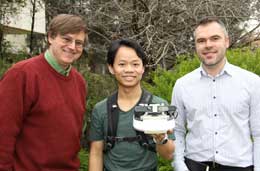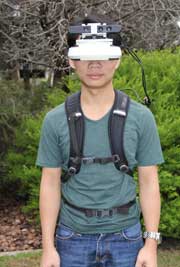19 September 2013

University of South Australia scientists are developing a wearable computer and augmented reality kit to aid Australia’s ground-breaking bionic eye research project.
UniSA’s Wearable Computer Lab, based at Mawson Lakes, has put the finishing touches on the ‘backpack’ kit and key staff members will head to Canberra to deliver the first prototype to National Information Communications Technology Australia (NICTA) tomorrow.
Wearable Computer Lab head Professor Bruce Thomas, co-director Dr Ross Smith and PhD candidate Thuong Hoang will present their ‘backpack’ wearable computer with customised head mount to NICTA’s Computer Vision research leader Professor Nick Barnes.
Additional systems of the ‘backpack’ kits will then be used for extended trials at NICTA, as part of Bionic Vision Australia’s bionic eye project.
UniSA’s chief researcher Prof Bruce Thomas says the point of the ‘backpack’ system is that it will allow NICTA to test ideas about the bionic eye, without a bionic eye having to be implanted.
“We are collaborating with NICTA and the Bionic Vision Australia to develop prototype hardware tailored to simulations of prosthetic vision,” Prof Thomas says.
Dr Smith says: “Using our system, NICTA will be able to run a study with any person, and they will be able to see as close as possible what someone with a bionic eye would be seeing.”
 Bionic Vision Australia aims to restore a sense of vision to people with diseases such as retinitis pigmentosa. A video camera fitted to a pair of glasses will capture and process images. These images will be sent wirelessly to a bionic implant at the back of the eye which stimulates dormant optic nerves to generate points of light that form the basis of images in the brain.
Bionic Vision Australia aims to restore a sense of vision to people with diseases such as retinitis pigmentosa. A video camera fitted to a pair of glasses will capture and process images. These images will be sent wirelessly to a bionic implant at the back of the eye which stimulates dormant optic nerves to generate points of light that form the basis of images in the brain.
UniSA researchers have developed the wearable processor and augmented reality kit to be used to develop and evaluate new algorithms for orientation and mobility.
Prof Thomas says it is exciting to be involved in world-leading research which provides a glimmer of hope to those left in the dark.
“I’m really excited about this because it is going to have a huge impact on people’s lives,” says Prof Thomas, who is also a NICTA Fellow.
“Being chosen to be involved in the Australian project is testimony to the Wearable Computer Lab’s reputation and capabilities.
“Our prototyping laboratory allows us to construct our own custom electronics and for a computer science department, this is very unique. The only other computer science departments in the world with similar capabilities are MIT and Georgia Tech in the US.”
Media contact: Kelly Stone office 8302 0963 mobile 0417 861 832 email Kelly.stone@unisa.edu.au




